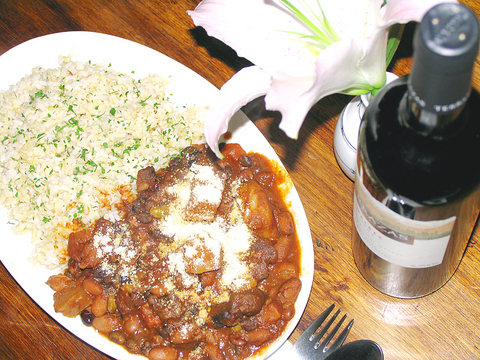Mei's Tea House is the latest place on popular Yongkang Street for students and bohemians to catch up with each other, take afternoon tea or enjoy dinner and a glass of wine. Atmosphere is everything in establishments of this kind and it's invariably the owner who sets the tone.
In this case we're in good hands because this is Mei Huang's (黃美瑛) second tea shop in the area and she has built a little oasis in the middle of Taipei central, where laptop owners can retreat with a pot of tea and wireless Internet access, lulled by the sounds of contemporary jazz and low-key conversations.
Mei's has a soothing decor. The wooden floors are complemented by whitewashed walls and red highlights, giving the tea house an ambiance that mixes Continental European and modern-day Chinese/Taiwanese influences. There are the essential comfy chairs and substantial wooden tables lit by orange lamps and spotlights. Modernist paintings adorn the walls and there are antique-style objects like tea urns dotted around. There's also a bar area and stools for those who fancy a drink and a chat.

PHOTO: JULES QUARTLY, TAIPEI TIMES
There is room, comfortably, for around 30 people. But on weekend evenings, when a live band turns up twice a month, it can get a little crowded and the emphasis is on fun rather than quiet reflection. A small deck area outside is popular and a great place to chat and watch the world drift by.
Apart from the atmosphere regulars come to sample an inventive but solid menu of drinks and food. There is an emphasis on Taiwanese black teas -- from Hualian, Sun Moon Lake and Hsinchu (NT$150) -- as Mei believes these are not appreciated as much as they should be.
"This is a not a place for just tea drinking," Mei says, "But a place where you can try tasting a lot of different things. We have various interesting kinds of coffees, wines and beers that are rotated. We do not have and will not have Corona or Heinekin."
Currently, Mei is stocking Italian beer (Peroni), Mexican Tecata, Dos Equis and a beer from Gavroche, France. Prices are under NT$150. Wines are from NT$800 for a Spanish reserve wine, up to NT$1,200 for QE Valvieso from Chile. Glasses of house white or red are NT$150.
As for the food, our meals were hearty rather than fancy. The beef curry (NT$200) came with corn chips or short grain rice. The beef was tender and an assortment of beans were smothered in a rich con carne sauce. The pasta fusilli dish (NT$180) was made with fresh vegetables and a sprinkling of herbs and a dash of white wine livened it up.

On April 26, The Lancet published a letter from two doctors at Taichung-based China Medical University Hospital (CMUH) warning that “Taiwan’s Health Care System is on the Brink of Collapse.” The authors said that “Years of policy inaction and mismanagement of resources have led to the National Health Insurance system operating under unsustainable conditions.” The pushback was immediate. Errors in the paper were quickly identified and publicized, to discredit the authors (the hospital apologized). CNA reported that CMUH said the letter described Taiwan in 2021 as having 62 nurses per 10,000 people, when the correct number was 78 nurses per 10,000

As we live longer, our risk of cognitive impairment is increasing. How can we delay the onset of symptoms? Do we have to give up every indulgence or can small changes make a difference? We asked neurologists for tips on how to keep our brains healthy for life. TAKE CARE OF YOUR HEALTH “All of the sensible things that apply to bodily health apply to brain health,” says Suzanne O’Sullivan, a consultant in neurology at the National Hospital for Neurology and Neurosurgery in London, and the author of The Age of Diagnosis. “When you’re 20, you can get away with absolute

May 5 to May 11 What started out as friction between Taiwanese students at Taichung First High School and a Japanese head cook escalated dramatically over the first two weeks of May 1927. It began on April 30 when the cook’s wife knew that lotus starch used in that night’s dinner had rat feces in it, but failed to inform staff until the meal was already prepared. The students believed that her silence was intentional, and filed a complaint. The school’s Japanese administrators sided with the cook’s family, dismissing the students as troublemakers and clamping down on their freedoms — with

As Donald Trump’s executive order in March led to the shuttering of Voice of America (VOA) — the global broadcaster whose roots date back to the fight against Nazi propaganda — he quickly attracted support from figures not used to aligning themselves with any US administration. Trump had ordered the US Agency for Global Media, the federal agency that funds VOA and other groups promoting independent journalism overseas, to be “eliminated to the maximum extent consistent with applicable law.” The decision suddenly halted programming in 49 languages to more than 425 million people. In Moscow, Margarita Simonyan, the hardline editor-in-chief of the